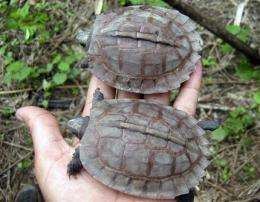Turtle thought to be extinct spotted in Myanmar

(AP) -- The rare Arakan forest turtle, once though to be extinct, has been rediscovered in a remote forest in Myanmar, boosting chances of saving the reptile after hunting almost destroyed its population, researchers said Monday.
Texas researcher Steven Platt and staff from the New York-based Wildlife Conservation Society discovered five of the brown-and-tan-spotted turtles in May during a survey of wildlife in the Rakhine Yoma Elephant Sanctuary.
The sanctuary contains thick stands of impenetrable bamboo forests, with the only trails made by the park's elephants, said Platt, of Sul Ross State University in Alpine, Texas.
Plat said he and his team were able to reach the area only by small boat and endured round-the-clock torrential rains and bands of leeches before finding their first Arakan turtle on May 31.
"At this moment, all of the physical hardships of the trip were forgotten," Platt said in an e-mail interview.
Native to the Arakan hills of western Myanmar, the turtles were believed extinct for close to a century until they started turning up in Asian food markets in the mid-1990s.
The local name for the turtle is "Pyant Cheezar," which translates to "turtle that eats rhinoceros feces." Sumatran rhinos were once found in the area, but vanished half a century ago due to hunting.
Scientists blame the near-disappearance of the turtle on their popularity in Asia as an ingredient in cooking and medicine. Known by its scientific name, Heosemys depressa, it is listed as critically endangered by the International Union for Conservation of Nature and Natural Resources and has proven difficult to breed in captivity.
The discovery in May makes scientists hopeful that the species can survive.
"Throughout Asia, turtles are being wiped out by poachers for the illegal wildlife trade," Colin Poole, the Wildlife Conservation Society's director of Asia programs, said in a statement. "We are delighted and astonished that this extremely rare species is alive and well in Myanmar. Now we must do what we can to protect the remaining population."
Douglas B. Hendrie, a freshwater turtle expert from Education for Nature-Vietnam who did not take part in the research, said he was not surprised by the discovery because he had heard anecdotes of hunters and guides finding the turtle.
"That said, I think it is good to bring attention to the species," Hendrie said in an e-mail interview, adding that it is an "an important part of furthering the aims of conservation."
Platt and the conservation society recommend that guard posts be set up on roads leading in and out of the park to thwart poaching and that additional data be collected on the species to develop a conservation plan for it.
©2009 The Associated Press. All rights reserved. This material may not be published, broadcast, rewritten or redistributed.


















